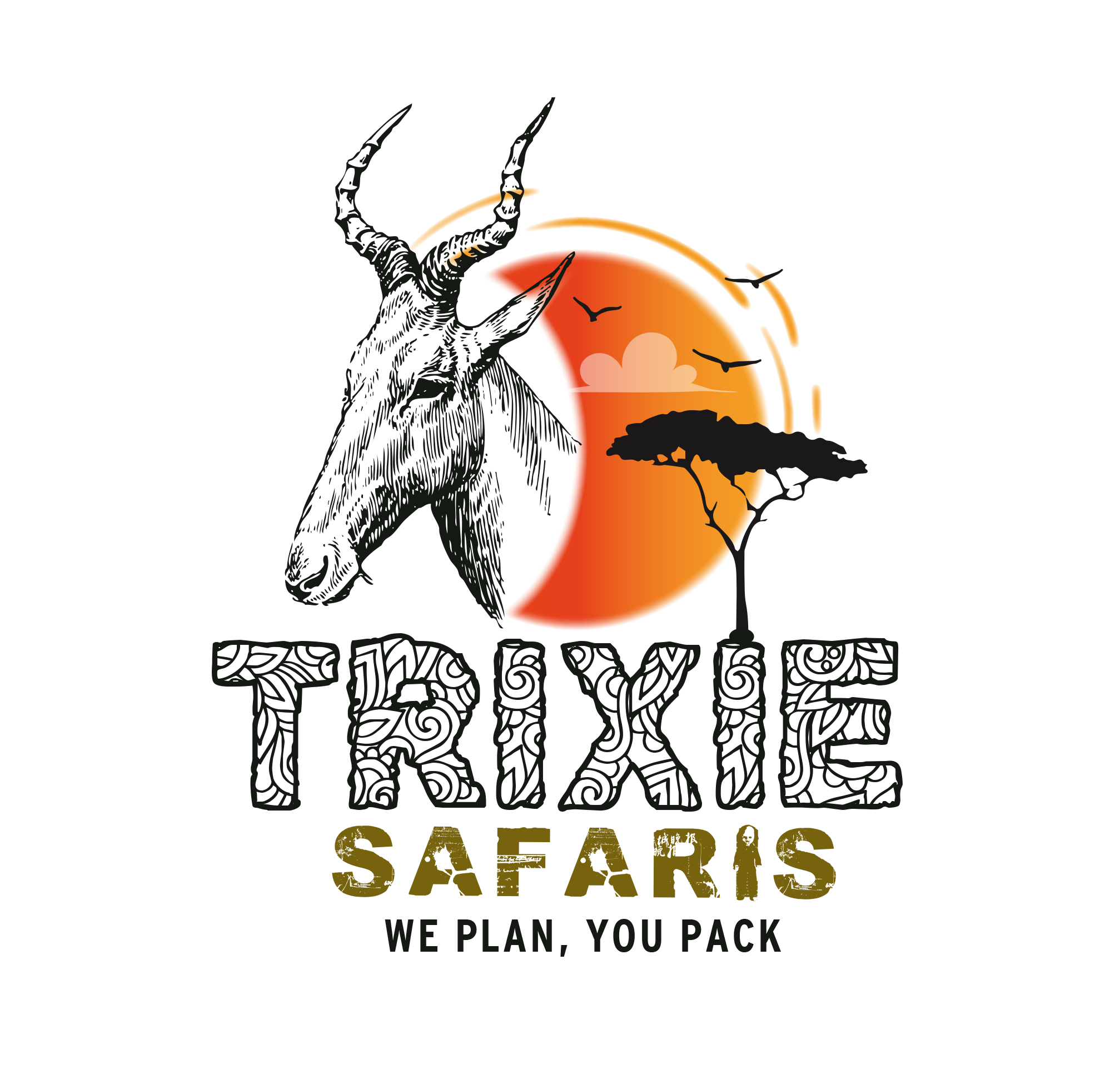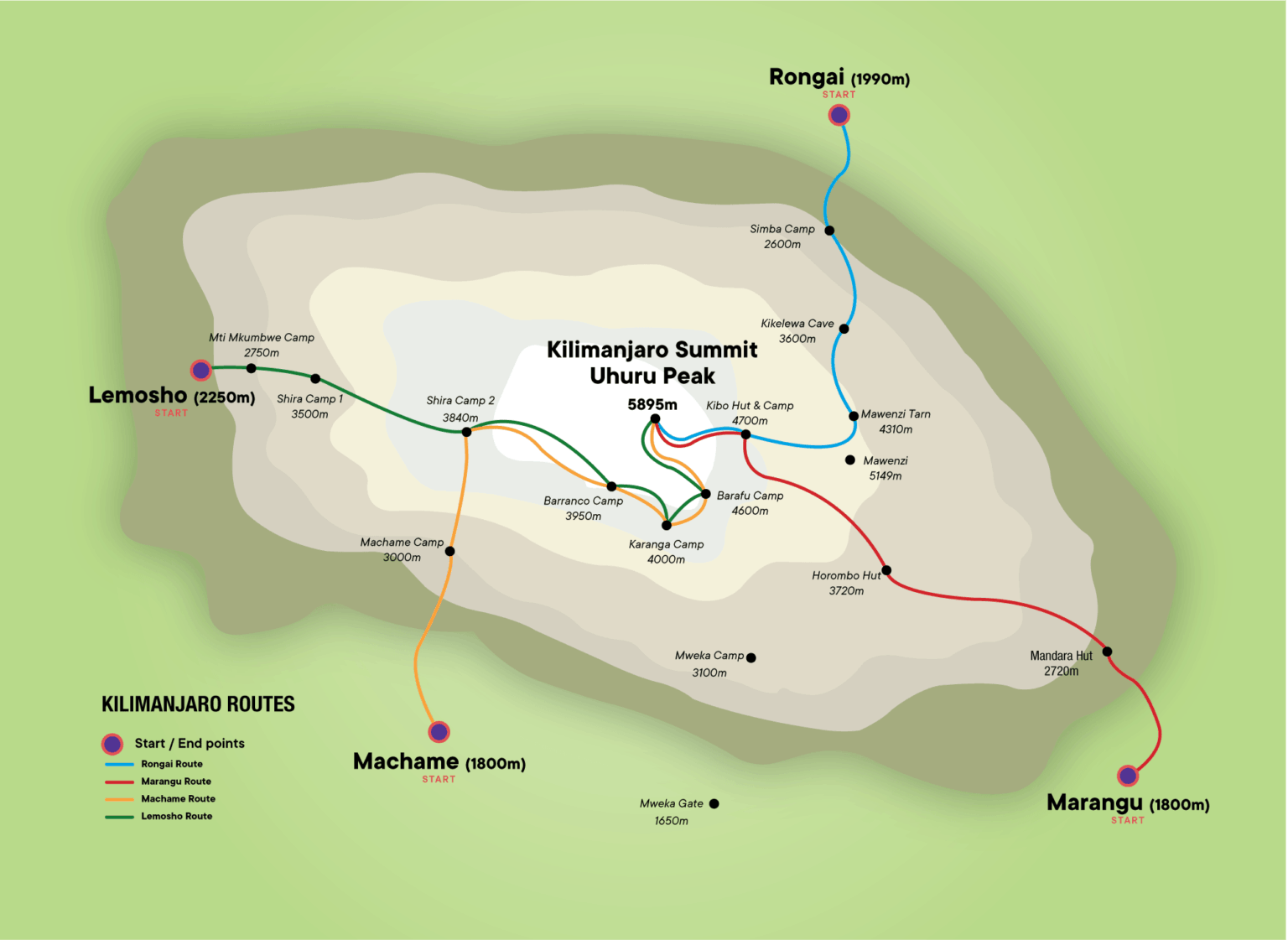9 Days Northern Circuit Route
- Home
- Itineraries
- 9 Days Northern Circuit Route
Introduction
The Northern Circuit is the newest and longest route on Mount Kilimanjaro. It begins in the West at the Londorossi Gate and follows the same path as the Lemosho route for the first two days. After crossing the Shira plateau the path veers north near Lava Tower, following the longer Northern Circuit instead of the more popular Southern Circuit via Barranco Valley The route circles around the quieter northern slopes to the east side of the mountain. The Northern Circuit is longer than the other trails on Kilimanjaro, taking a minimum of eight or nine days to complete.
The eight-day trek skips the additional acclimatization day that is usually spent at Shira Camp 2 and continues straight on to Moir Camp.
Day 0: Pre-trek Briefing
If you have opted for the optional airport transfers, we will pick you up from Kilimanjaro Airport or Arusha airport and transfer you to your hotel in Moshi. Pre-trek briefing at your Moshi hotel. You should be planning to arrive at least one day before the start of the trek. Today we will spend time having a pre-trek briefing. We will also review your equipment and rent any equipment which is needed.
Day 1: Hotel to Mti Mkubwa Camp
After breakfast and briefing, drive to Londorossi Park Gate (about a 3-hour drive). From here a forest track requiring a 4WD vehicle leads to Lemosho Glades. Walk along forest trails to Mti Mkubwa (big tree) campsite.
- Elevation: 1830m/6000ft to 2650m/8700ft
- Distance: 6km/4mi
- Hiking Time: 2-3 hours
- Habitat: Montane Forest
- Meals: Lunch and Dinner
Day 2: Mti Mkubwa Camp to Shira 1 Camp
After breakfast, we continue as the trail gradually steepens and enters the giant heather moorland zone. After several streams are crossed we continue over the Shira Ridge then gently downwards to Shira 1 camp located by a stream on the Shira Plateau.
- Elevation: 2650m/8700ft to 3500m/11,500ft
- Distance: 8km/5mi
- Hiking Time: 4-5 hours
- Habitat: Moorland
- Meals: Breakfast, Lunch and Dinner
Day 3: Shira 1 Camp to Shira 2 Camp
After breakfast, a gentle hike across the plateau leads to Shira 2 camp on moorland meadows by a stream. A variety of hikes are available on the Plateau, making this an excellent acclimatization day.
- Elevation: 3500m/11,500ft to 3850m/12,600ft
- Distance: 8km/5mi
- Hiking Time: 4-5 hours
- Habitat: Moorland
- Meals: Breakfast, Lunch and Dinner
Day 4: Shira 2 Camp to Moir Camp
This day is a long trek heading east which passes through the ‘Garden of the Senecios’ and then enters the high alpine desert zone. The morning is spent trekking up to Lava Tower and the iconic Shark’s Tooth rock formation at 4,600 meters, where you will have lunch. After lunch you will join the Northern Circuit heading down to Moir Camp at 4,200 meters. This is an important day in your trek as you will get to experience high altitude and then sleep low, which is good for the acclimatisation process.
- Elevation: 3850m/11,500ft to 4200m/13780ft
- Distance: 14km/8mi
- Hiking Time: 5-7 hours
- Habitat: Moorland
- Meals: Breakfast, Lunch and Dinner
Day 5: Moir Camp to Buffalo Camp
Today, we encountered a moderately steep climb out of Moir Valley. We can do an optional hike to the summit of Little Lent Hill at 4,375 meters before returning to the Northern Circuit trail. From here the route follows a series of inclines and declines, skirting around the northern slopes of Kibo to Buffalo Camp.
- Elevation: 4200m/13,780ft to 4020m/13,188ft
- Distance: 12km/7mi
- Walking Time: 5-6 hours
- Habitat: High Alpine
- Meals: Breakfast, Lunch and Dinner
Day 6: Buffalo Camp to Rongai Third Cave
We start the day with a climb up the Buffalo ridge and down into Porfu Camp where lunch is usually served. The route then continues east around the northern slopes to the Rongai Third Cave. The trek is shorter than the day before and by now you should be feeling well acclimated to the altitude. You will arrive at the Third Cave just around mid-afternoon.
- Elevation: 4020m/13,188ft to 3800m/12,467ft
- Distance: 8km/5mi
- Climbing Time: 5-7 hours
- Habitat: High Alpine
- Meals: Breakfast, Lunch and Dinner
Day 7: Third Cave to School Hut
Today involves a steady incline up and over the Saddle which sits between the peaks of Kibo and Mawenzi Peak. Trekkers then continue walking south-west up to School Hut. After arriving at School Hut you will be served an early dinner and then you should get some shut-eye as you will be awoken before midnight to start your summit attempt. Remember to prepare all your gear, including warm clothes, insulated water bottles, snacks, headlamp and camera before going to bed.
- Elevation: 3800m/12,467ft to 4800m/15,748ft
- Distance: 15km/8mi
- Climbing Time: 4-5 hours
- Habitat: Alpine Desert
- Meals: Breakfast, Lunch and Dinner
Day 8: School Hut to Uhuru Peak to Millennium Camp
You will be awoken around 11:30 with hot tea and biscuits and will then begin the steep incline up the slopes of Kibo under the cover of darkness. Your first check-point is Hans Meyer Cave where you will take a short break. The climb steepens as you approach Gilman’s Point (5,681 meters), which will be around 5-6 hours after departing School Hut.
Take a moment to enjoy the approaching dawn and incredible view out and across to Mawenzi Peak, but remember you still have 2 hours trekking to reach Uhuru Peak so dig deep for the energy. The slope flattens as you head west around the crater rim and you should arrive at the summit at or just after sunrise.
Your stay here will be brief so get as many pictures as you can of the incredible views and surrounding glaciers. You will then retrace your steps back around the crater rim to Stella Point (5,739 meters) where you will turn south and head down the heavily screed slopes of Kibo to Barafu Camp (4,680 meters).
Most trekkers take a short break here before continuing down to Millennium Camp (3,950 meters) for your final night on the mountain. In total you will be trekking for 14-16 hours on day eight so it is important to pace yourself, remain hydrated and keep your blood sugar levels up.
- Elevation: 4800m/15,748ft to 5895m/19,340ft
- Down to 3950m/12,959ft
- Distance: 6km/3.5mi up / 11km/6mi down
- Hiking Time: 5-7 hours up / 5-6 hours down
- Habitat: Stone scree and ice-capped summit
- Meals: Breakfast, Lunch and Dinner
Day 9: Millennium Camp to Mweka Gate to Hotel
After breakfast we continue the descent down to the Mweka Park Gate to receive your summit certificates. At lower elevations, it can be wet and muddy. Gaiters and trekking poles will help. Shorts and t-shirts will probably be plenty to wear (keep rain gear and warmer clothing handy). Our vehicle will be waiting for you at Mweka gate to drive you back to your hotel in Moshi (around 60 minutes).
- Elevation: 3950m/12,959ft to 1680m/5500ft
- Distance: 10km/6mi
- Hiking Time: 3-4 hours
- Habitat: Forest
- Meals: Breakfast
Day 10: Departure Day
On your departure day, Esikar Tour and Safaris organizes a timely transfer from your lodge to Kilimanjaro International Airport (JRO). Reflect on your unforgettable safari as you bid farewell to the enchanting landscapes of Tanzania.
Depart with cherished memories and a heart full of the African spirit, marking the conclusion of your Mount Kilimanjaro adventure.
Included
- Private transport to and from Kilimanjaro International Airport to your accommodations in Moshi
- 2 nights’ accommodation in Moshi in full board (Weruweru River Lodge or Park View Hotel)
- Transportation to and from the Kilimanjaro gate
- Park entry fees
- Camping fees
- Crater fee (if applicable)
- Kilimanjaro Rescue fees
- 18% VAT on tour fees and services
- Four-season mountain tents
- Double-layered sleeping mats (4 inches / 10cm thick)
- Friendly and professional mountain guides, cook, and porters
- Three meals daily while on the mountain
- Sufficient treated and filtered drinking water throughout the trek
- Hot water for washing
- Fair wages for the mountain crew as per Kilimanjaro National Park Authority (KINAPA) and Kilimanjaro Association of Tour Operators (KIATO) standards
- Government taxes
- Portable oxygen tanks
- Ox meter
- Emergency first-aid kit
- Stethoscope
- Portable flush toilet with tent
- Mountain climbing certificates
Excluded
- Drinks at your hotel before and after the climb
- Travel insurance
- Flights
- Laundry (available at the hotel)
- Personal items and toiletries
- Tips for guides, porters, and cook
Mount Kilimanjaro is located in Tanzania, East Africa. It is the highest peak in Africa and the highest free-standing mountain in the world.
The highest peak is Uhuru Peak, standing at 5,895 meters (19,341 feet) above sea level.
The best time is during the dry season, from late June to October and January to mid-March, for stable weather conditions.
It takes 5-9 days on average, depending on the route and pace.
The altitude is 5,895 meters (19,341 feet) at its highest point.
Kilimanjaro offers several trekking routes to the summit, each with its unique challenges and scenic views. The most popular routes are:
- Marangu Route (also known as the “Coca-Cola Route”): Easiest, with hut accommodations.
- Machame Route (the “Whiskey Route”): Challenging but scenic.
- Lemosho Route: Longer, allowing for better acclimatization.
- Rongai Route: Quieter and more remote.
- Umbwe Route: The steepest and most direct, recommended for experienced trekkers.


